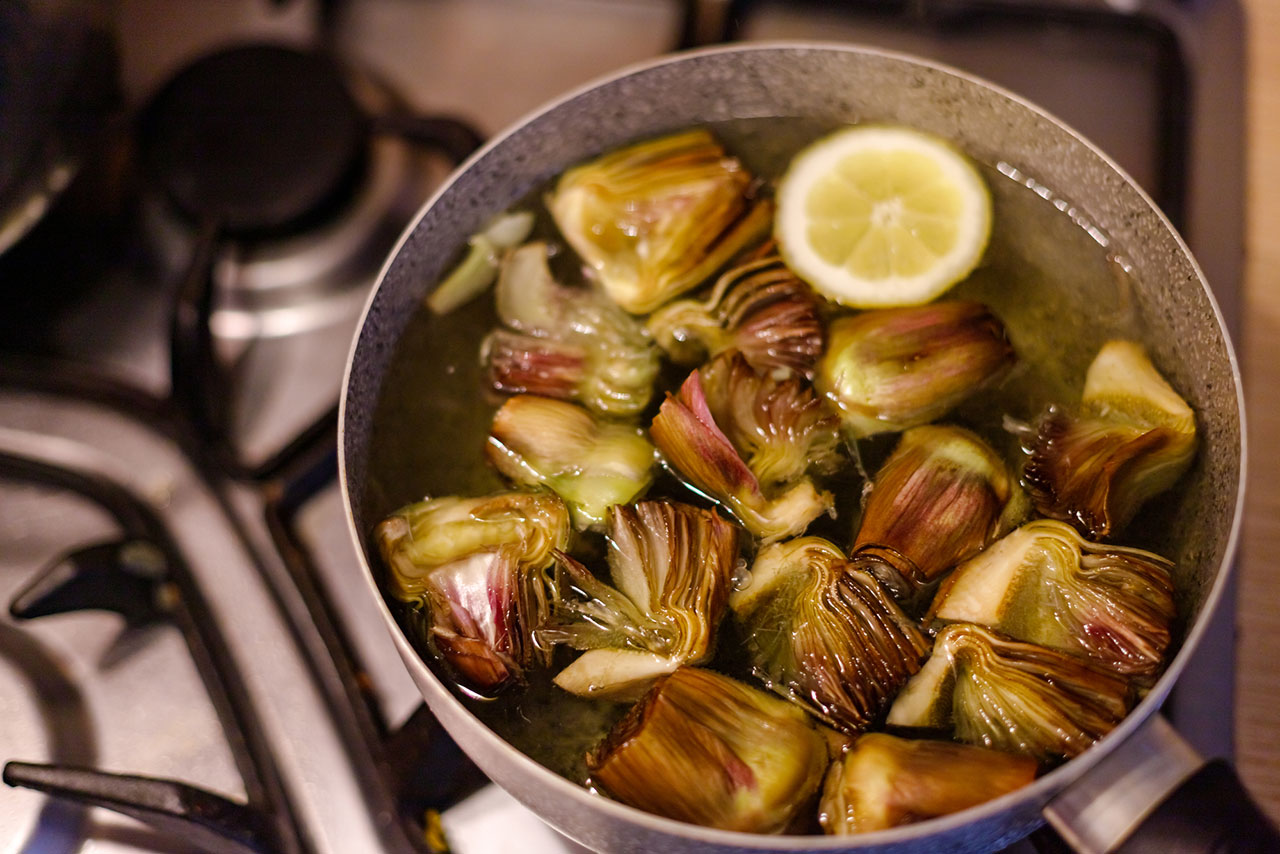Can Dogs Eat Artichokes?
What Are Artichokes & Where Do They Come From?
A type of vegetable linked to the thistle plant is artichoke. They are grown in many different parts of the world and can be eaten either cooked or raw. Artichokes taste slightly bitter and are often dipped in sauce before eating. When cooked, the outer leaves of the artichoke can be eaten, and the innermost part of the vegetable, called the “heart,” is considered the most delicious part.
Artichokes are nutrient-rich vegetable that is low in calories and fat. In addition, they are a good source of fiber, vitamin C, vitamin K, and folic acid. Artichokes also contain a substance called cynarin, which has been shown to have beneficial effects on cholesterol levels and digestion.
Benefits of Artichokes in Dogs’ Health
Artichokes are provides good source of nutrients sch as antioxidants, healthy vitamins, and minerals that can improve your dog’s health in many ways. Here are ten health benefits of eating artichokes for dogs that you should know about!
1. Artichokes are a great source of antioxidants.
Dogs need antioxidants because they help in defending the body against free radicals, which can harm cells and cause disease. Artichokes contain antioxidants, including vitamins C and E, folic acid, and beta-carotene. These vitamins and minerals can strengthen your dog’s immune system and shield its cells from harm.
2. Artichokes can help to improve digestion.
Dietary fiber from artichokes is a wonderful source and can help your dog’s digestive system. Fiber helps to keep dog’s stomach clean and functioning correctly. Additionally, it gives the stool heft, which can help in preventing constipation and other digestive problems.
3. Artichokes can help to lower cholesterol.
The fiber content in artichokes can also help to lower cholesterol levels. In order to prevent health issues like heart disease, fat content must be under control.
4. Artichokes can help to protect the liver.
The antioxidants in this vitamin-rich vegetable can also help to protect the liver. Maintaining good liver function is crucial because it filters pollutants from the body.
5. Artichokes can help to fight cancer.
Studies have shown that the antioxidants in artichokes can help to fight cancer. They can help in cell damage prevention and cancer cell growth inhibition.
6. Artichokes can help to prevent arthritis.
This antioxidant-rich veggie can also help to prevent arthritis. Dogs frequently experience arthritis, especially as they get older. The antioxidants’ anti-inflammatory properties can help reduce the pain and swelling associated with arthritis.
7. Artichokes can help to improve brain function.
The antioxidants in artichokes can also help to improve brain function. They can improve neuronal transmission and assist in cell damage prevention. As they age, your dog’s mind will remain sharp thanks to this, which can also stop cognitive decline.
8. Artichokes can help to detoxify the body.
Artichokes are also a good source of inulin, a fiber that acts as a prebiotic. Prebiotics helps in fostering the development of beneficial bacteria in the gut. These healthy bacteria can help to detoxify the body and improve overall health.
9. Artichokes can help to boost the immune system.
The antioxidants, vitamins, and minerals in artichokes can all help to improve dogs’ immune systems. This can help to protect your them from disease and improve your dog’s health.
10. Artichokes are a natural source of energy.
Artichokes are also a natural source of energy. The inulin in artichokes can help to regulate blood sugar levels and provide a slow release of energy. This can help your dog stay active and healthy.
As you can see, eating artichokes for dogs has many health benefits. Adding artichokes is an excellent option if you’re looking for a healthy way to improve your dog’s diet. They are packed with essential nutrients that can help to improve your dog’s health in many ways.
How Do You Prepare & Cook Artichokes So That They’re Safe & Healthy For Your Dog to Eat?
If it’s your first time preparing artichokes for your dog, there are a few things to bear in mind. First, only give them cooked artichokes – raw ones can be tough on their digestive system. Second, avoid adding any seasoning or sauces to the artichokes, as these may contain harmful ingredients in your dog’s body. Finally, remove the choke from the artichoke before giving it to your dog, as this can result in a choking hazard.
For your dog’s safety and health, here is the right way to cook and prepare artichokes:
1. Start by trimming off the artichoke’s stem. It’s also a good idea to cut off the top quarter of the whole artichoke if you’re worried about your dog choking on it.
2. Cut the fresh artichokes in half or in bite-sized pieces, then place it in a pot of boiling water.
3. Cook the unseasoned artichokes for 15-20 minutes or until it’s tender.
4. Remove the artichoke from the pot, then let it cool before giving it to your pet dog.
5. Once cooled, remove the choke from the center of the artichoke half. You can do this by using a spoon to scoop it out or by simply breaking it off with your fingers.
6. Give your dog the prepared artichoke and let them enjoy it!
Are There Any Dangers Involved In Giving Dogs Artichokes?
While artichokes can be a great addition to a dog’s diet, it’s essential to be aware of the risks involved before feeding them this vegetable.
If you’re considering feeding your dog artichokes, you must be aware of the potential risks. Here are ten risks associated with feeding artichokes to dogs:
1. Vomiting: Artichokes can cause vomiting in some dogs with sensitive stomachs. If your dog vomits after eating an artichoke, it’s essential to take them to the vet immediately.
2. Diarrhea: Diarrhea is another common side effect of feeding artichokes to our furry friends. If your dog has diarrhea, it’s essential to increase their water intake and watch for dehydration.
3. Pancreatitis: Artichokes can also cause pancreatitis in dogs. Pancreatitis is a severe condition that can be life-threatening if your dog shows signs of pancreatitis (such as vomiting, diarrhea, appetite loss, or abdominal pain).
4. Allergic Reactions: Some dogs may be allergic to even small pieces of artichokes. Signs of an allergic reaction include itching, hives, swelling, and difficulty breathing. You need to get your dog to the vet right away if you suspect an adverse reaction.
5. Gastrointestinal Obstruction: Artichokes can cause gastrointestinal obstruction in dogs. This condition occurs when a foreign body (such as an artichoke) becomes lodged in the gastrointestinal tract. Symptoms of gastrointestinal obstruction include vomiting, diarrhea, appetite loss, and abdominal pain.
6. Intestinal Blockage: Artichokes can also cause intestinal blockage in dogs. This condition occurs when a foreign body (such as an artichoke) becomes lodged in the intestines. Symptoms of intestinal blockage include vomiting, diarrhea, appetite loss, and abdominal pain.
7. Artichoke Poisoning: Raw artichokes can be poisonous to dogs. Symptoms of artichoke poisoning include vomiting, diarrhea, seizures, and death. It’s critical to take your dog to the vet right away if you suspect they may have consumed a deadly artichoke.
8. Kidney Disease: Artichokes can cause kidney disease in dogs. Increased urination, thirst, appetite loss, weight loss, and vomiting are all signs of renal failure.
9. Liver Disease: Artichokes can also cause liver disease in dogs. The symptoms of liver disease include loss of appetite, weight loss, nausea, vomiting, diarrhea, and jaundice.
10. Death: In some cases, artichokes can be fatal to small dogs. It’s critical to take your dog to the veterinarian right away if you suspect that they ate contaminated artichoke.
While artichokes can be a healthy addition to a dog’s diet, it’s essential to be aware of the risks involved before feeding them this healthy treat.
Artichokes are healthy vegetables that both humans and dogs can enjoy. They are an excellent source of fiber, the antioxidants C and K, as well as the minerals magnesium and potassium. Artichokes also contain antioxidants that help protect the body from disease. While artichokes are safe for dogs to eat, they should not be given in large quantities.


